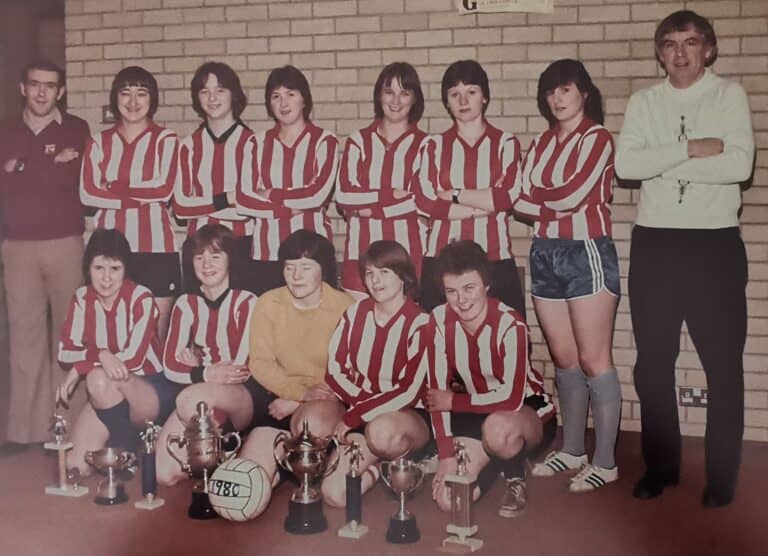Directed by Margaret Gordon, who is also a stalwart Finn Harps volunteer
Pretty much everyone has heard about the troubles in Northern Ireland, even if they didn’t experience them. “Troubles” might imply that this was a period of time characterised by minor hostilities and friction. The reality was very different. From 1969 to 1998, 3,598 people died during the “troubles.” Over half of the victims were civilians and 257 were children.
This was a conflict where many of the victims were killed in horrific and deliberate acts of violence. Yet somehow in this traumatised population, people found a way to live and pursue their normal routines and activities. People built up a level of resilience and the determination that was necessary to keep on keeping on.
As a “border person” I was not directly affected by the troubles, though my focus was always “what was going on in the North,” rather than, what was happening in the rest of Ireland.
Despite the conflict, sporting fixtures were largely unaffected by the conflict, and travelling teams appeared to have safe passage from paramilitaries. Football league fixtures proceeded through the seasons without incident. And for myself, football was the beautiful game. However, at that time, all over the world, football competitions were primarily set up for men, and football was played by men. Myself and my friends thought differently. We had spent our childhoods playing football on the greens, competing with our male friends. Looking back now, I think our interest was tolerated and maybe a source of amusement to the adults in our lives. We were girls and the stage was already set for us to come into the fold. We were expected to move away from these childhood games and settle down into adulthood. To get serious about life, finish our education and pursue something like nursing, secretarial work or teaching.
As teenagers, we were not yet interested in pursuing these responsibilities. We just wanted to play football. And so, against all the odds, we formed a football team made up of young women. We played the beautiful game in Donegal and across the border in Northern Ireland. We played in an area where people were divided by a border, communities, religion and gender. Our hybrid group of young teenagers broke all the rules when we formed a team that was both cross border and cross religion. We all loved the beautiful game. To us, football was the only thing that mattered.
And so, a group of football crazy young women from TT Harps football team in Donegal, joined up with Glebe United from Northern Ireland to form one cross-border team. When we played in the south, we were TT Harps and in the North we were Glebe United. We were teenage girls from Ballybofey, Sion Mills, Strabane and Newtownstewart. And we were pragmatic. In forming our team, we were ignoring the constructed divisions of the border, the divided communities and deeply held religious beliefs that isolated so many people during the conflict. Instead, we forged our own path and found our own safe space, despite the ongoing conflict.
In 1979, when our cross-border team was formed, there were over 120 people killed in, and around the border counties of Ulster. Many more people were victims of “punishment beatings and shootings.” This was also a time when ‘being young’ made you vulnerable. Being young made it more likely that you could be recruited into organisations that put a target on your back. And while the vast majority of the victims of the troubles were young men, fifteen percent of women that were killed were just 19 years old. The average age of our team was just 18. It was against this backdrop that an extraordinary bond was forged between women who would not ordinarily have met, let alone be friends.
In 2022, I was part of a group of 4 people, who, through the Nerve Centre in Derry, began to make a short documentary, “Crossing Lines.” Seamus Gordon, Tom Hannigan and Sean Harkin and myself made contact with some of my 1979 teammates that were still living locally.
The film we made, is the story of our reunion, during which we remember what the beautiful game gave to us. Now, forty years later, I understand that the football team we created was something utterly unique. I don’t know of any team at that time, other than the Ireland Rugby Team, that was both cross-border and cross-religion. But where the IRFU was a structured and well-funded organisation, it was an organisation set up for men. And, it was a sport played by men.
We were a group of young women, without the support or recognition of an organisation. We funded ourselves, bought our own football kits and paid for our own transport. We played together. We formed friendships that would not have had the chance to flourish, within the divided communities of Northern Ireland. Football gave us a place to step outside the social norms. We created our own space within which we were deaf to the doctrine of community leaders and politicians. While many of those politicians were refusing to talk to each other, the friendships formed within our team gave us strength. We let our football do the talking.
When we met up in 2022, to work on Crossing Lines, I hadn’t seen Maggie Patterson for over 30 years. And she’s still the same. Older? Yes, but the young Maggie still shines through. She’s still a talker, a battler and a glass half full person.
I’ve known Teresa Conway since I was 15 years old. She was my best friend in my teenage years and is still my best friend. We had so much in common when we met and although we lived most of our adult lives in different places, we have never really been separated from each other.
Tena Quigley became one of my close friends during my late teens and early twenties. Myself, Tena, Teresa, Maggie and Geraldine Maguire, from Newtownstewart, were like a band of sisters. We formed a close bond and looked out for each other.
We all remember Jimmy Conwell. One of only two males within our group. As manager, driver, supporter and friend, Jimmy was the man in the middle. Without him, so many of these memories would not exist. He was the person that brought us together and he kept us together.
He shaped an environment around us, where all of us mattered. An environment where we all belonged and where we all felt safe. At that time, as young women, we took so much of this for granted. Jimmy was just there. Like our parents were just there. And then there was Joe Houston, our trainer and friend. Not much older than us, but definitely the boss on the training field. He put us through our paces and instilled in us, a level of confidence and belief in our abilities. Joe Houston died at the age of 32. He left his mark on all of us. As young women, we were not mature enough to appreciate the sense of security that came with having these two trusted and consistent adults in our lives. We will never know how much different our lives would have been if we had never had our hybrid football team. If we had never met Jimmy Conwell. If we had not been able to persuade Joe Houston that we needed his help if we were to excel. At a time when many people were experiencing the trauma of living in a warzone, our hybrid team seemed to fly under the radar. We flew through a space that afforded us a greater level of protection from that environment.
The beautiful game of football enriched the lives of all of us. It created a world for us in which we could step outside the commonplace fear, division and hatred that was prevalent during the troubles. In our world, our football world, this fear and division was largely dismantled. We replaced the fear and division with acceptance and friendship.
Our short film “Crossing Lines” is to be shown as part of the Docs Ireland Documentary Festival in Belfast, on 25th June at 12.30pm, in the Black Box.






